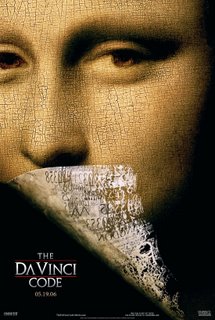 The long-awaited (and now hyper-hyped) DaVinci Code comes out in less than a month. Opinions are oozing from magazines, newspapers, bookstands, television specials and daily news shows. Not much new can be said about the film—secular, Christian or otherwise—that hasn’t already been said. (I'm planning on compiling a comprehensive list of these resources and posting them here, hopefully in the next week or two.)
The long-awaited (and now hyper-hyped) DaVinci Code comes out in less than a month. Opinions are oozing from magazines, newspapers, bookstands, television specials and daily news shows. Not much new can be said about the film—secular, Christian or otherwise—that hasn’t already been said. (I'm planning on compiling a comprehensive list of these resources and posting them here, hopefully in the next week or two.)But over the last several months, Christian commentators (like Scot McKnight, Mark Roberts and others) have uncovered some larger, underlying issues that I'd like to highlight here. Rather than particular topics regarding the novel or film, these are more general concerns exposed by The DaVinci Code phenomenon—and they pose problems we Christians must address.
Many of us don’t know our faith’s history.
One of the major focuses of Christian experts is aimed at confronting the abundance of errors in The DaVinci Code regarding church history, doctrine and the Bible. Most of the printed material out there has to do with setting the record straight on these topics.
On the one hand, this is a wonderful opportunity to get correct information about Christianity, the Bible and Jesus into the public square. Our culture has endless misconceptions about the Christian faith and this is a chance to correct those.
On the other hand, however, the phenomenon has revealed a dearth of knowledge among Christians regarding the history of the Bible and our own faith—myself included. While I benefited from a Christian college education, The DaVinci Code had me desperately dusting off the covers of old textbooks and too-long-shelved Josh McDowell and Lee Strobel paperbacks.
This is a critical wake-up call for the Church. We must do better at educating ourselves about church history and the Bible. Granted, many churches are taking advantage of this film to do just that. But after the hype disappears, what then? How do we continually educate both ourselves and our culture about the history and reliability of our faith? And what about the black spots in church history? Are we dealing honestly with those? These are questions we must reflect on and answer.
Many of us don’t know the Bible.
The novel also raises significant issues about the content of the Bible—such as questioning the deity of Jesus and the nature of God himself. Again, on the one hand, this is a great opportunity to bring accurate God-talk into public spaces. But, on the other hand, it reveals that many Christians are biblically ignorant. In other words, too many of us don’t know the Word.
The Bible is a record of God’s revelation about who he is and how he and the world around us really work. If we don’t know the Word, we’re unprepared to counter errors like those in The Da Vinci Code. How can we defend our faith if we don’t know why we believe what we do?
But there is something even more serious at risk here. The Bible is one of the primary ways God reveals himself to us. If we don’t know the Word, we hinder our ability to know God himself. And if we don’t know God, our lives will not reflect him. We will be no different than those around us. And that leads to the last observation.
Many people are hungry for spiritual truth—and they’re not finding it in church.
More than one Christian commentator has observed that the frenzied interest in The DaVinci Code reflects a strong interest, if not hunger for, spiritual truth—which people apparently aren’t finding in many of our churches.
Christian scholar and writer Mark Roberts points out in an essay on The DaVinci Dialogue that DaVinci Code fans say they are attracted to the novel’s Jesus because he’s more accessible than the one they encounter in church. Perhaps one reason for their misconception is that they haven’t read the Bible. (Roberts points out the gospels present a far more human and down-to-earth Jesus than the Gnostic documents on which DaVinci Code relies.) But perhaps another reason is that they haven’t encountered him in the people they know as Christians.
We can’t make Jesus real to others if he isn’t real to us. If we don’t surrender our lives constantly to God, if we don’t study his Word, if we don’t confess and apologize to God when we've missed the mark, if we don’t rely on him instead of ourselves, then we live an empty religion that holds no appeal and makes no difference to anyone who sees, meets or gets to know us.
But if we seek God and surrender to him constantly—if we live by faith—then he will transform us. Then people will see there is a better way to live this life. They will see Jesus. Many will reject him, but some will not—and that matters.
We can’t afford to miss this opportunity.
I whole-heartedly agree with Christian commentators like Roberts who say this film is a must-take opportunity. But we should go beyond factual defense and error correction. If we don’t address the larger issues, we’re missing the biggest opportunity of all.
So, let’s not only educate others about church history, let’s educate ourselves. Let’s renew our commitment to know God’s Word inside and out and be prepared to answer why we believe what we do. And, above all, let’s recommit to constantly surrendering our lives to God so that people hungry and thirsty will know where they too can get their fill.
(Image: Sony Pictures SoDarktheConofMan.com)